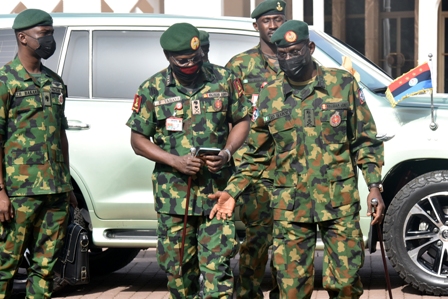Editorial
Enhancing Prevention Of Epidemics

Devastated by COVID-19, humanity has discovered the hard way how to prepare for epidemics. To make everyone ready for future outbreaks and sensitise people about epidemics on all levels, the United Nations and the World Health Organisation set aside December 27 annually as the International Day for Epidemic Preparedness.
The day was first observed last December 27, 2020, when the United Nations General Assembly (UNGA) had emphasised the need to advocate the importance of preparedness, prevention, and partnership against epidemics. The UN says it is necessary to learn lessons about managing epidemics and apply them to reinforce prevention and have the most sufficient response for any future catastrophe.
Solidarity and coalition among all international organisations, every community and individual, to combat an epidemic like COVID-19 is crucial. Marking the day, the UNGA had asked all its member-states to employ awareness-raising campaigns and education to exchange information, scientific knowledge along with best practices to help step up the preparedness for epidemics.
In a statement to mark the day, WHO stated the need of the hour was to invest in systems that could help detect, prevent and respond to outbreaks having the ability to disrupt health systems, supply chains and livelihood of, especially the poorest countries. It is also intended to popularise the One Health approach, which promotes the integration of plant health, human health and animal health with other relevant sectors.
According to AntónioGuterres, Secretary-General of the United Nations, COVID-19 had enabled us to rejuvenate sustainable and more equal work. He added that the reaction to the widespread discontent that preceded the pandemic must rest on a new global agreement and social contract. This is a means of creating equal chances for all while respecting rights and freedoms.
WHO should work closely with governments to bolster efforts to build strong emergency and epidemic preparedness systems, as part of an overall approach to advance universal health coverage and strengthen primary health care systems. Resilient and robust health systems are necessary to reach the vulnerable.
As demonstrated by the COVID-19 pandemic, major infectious diseases and spurts have devastating effects on human life, shattering long-term social and economic development. Global health crises threaten to dominate already overburdened health systems, disrupt global supply chains and cause disproportionate devastation to the livelihoods of populations and economies of weak countries.
Without international attention, future epidemics could outpace previous ones in terms of intensity and severity. Hence, there is a strong need for programmes to raise awareness and advocate on epidemics at the local, national, regional and global levels as effective measures to prevent and respond to them.
International cooperation and multilateralism play an important role in responding to pandemics. We have to emphasise the importance of partnership and solidarity among individuals, communities, countries, regions and global organisations at all stages of epidemic management, and the implication of considering gender perspectives in this regard.
Consistent with worldwide efforts to prepare for epidemics, Nigeria has taken critical steps to enhance its preparedness for future outbursts. In 2011, the Federal Government established the Nigeria Centre for Disease Control (NCDC) to oversee epidemic preparedness and, in 2017, participated in an evaluation of the country’s readiness with support from WHO, which led to the creation of a national action plan for health security.
Federal, state and local authorities should increase public and political support for further investment in epidemic preparedness. This must be taken as a national priority, recognising Nigeria’s exposure to a variety of imported and endemic diseases given the country’s massive population and role as a trade and travel hub. Civil society groups have to raise awareness and mobilise the public to support political leadership.
Media campaigns about the primacy of an investment in preparing for outbreaks are imperative. Likewise, media events, radio segments and video messages from respected religious and community leaders can also help increase awareness and support. Online hashtag engagements may be one of the most valuable conversations on social media about preventing epidemics. This must be complemented by strict adherence to all COVID-19 rules.
It was recently revealed that funding for NCDC did not always reach the agency and that state health financing was often left to lapse. That is not good enough. It is a weak indication that we are reluctant to deal with the latest wave of COVID-19 (Omicron) and future outbreaks. To promote transparency, accountability, and sustainability of investments in preparedness, the government should develop a Health Security Financing Accountability Framework.
The framework can be utilised to track budget allocations, expenditures and outcomes at the federal, state and local levels and to identify spending barriers and inform promotional activities. Stakeholders should work with policymakers to disaggregate spending data, if necessary, to track releases to different levels of government.
Editorial
Sustaining OBALGA’s Ban On Street Trading

Editorial
AFCON ’25: Bravo, Super Eagles, But…

Editorial
Fubara: Celebrating A Leader At 51

-

 Sports3 days ago
Sports3 days agoArsenal Women End Man City’s Invincibility
-

 Sports3 days ago
Sports3 days agoU-20 WWC: Falconets claim qualifier win
-

 Sports3 days ago
Sports3 days agoInsurance Deepen Enyimba’s Trouble
-

 Sports3 days ago
Sports3 days agoYouth Olympics preparation Gears up
-

 Sports3 days ago
Sports3 days agoCologne Youth Team Set Crowd Record
-

 Sports3 days ago
Sports3 days agoTornadoes Set For NPFL exit over Stadium Ban
-

 Sports3 days ago
Sports3 days agoPalmer Stars As Chelsea Compound Wolves Woes
-

 Sports3 days ago
Sports3 days agoBarca Pull Out Of Super League Project

